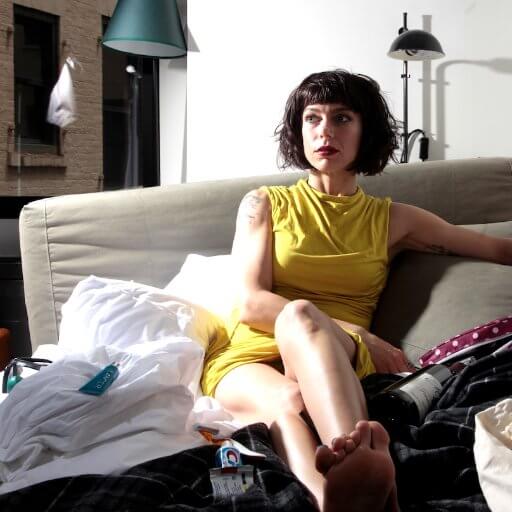
Maggie Rogers: How much of Everything You Touch is biographical?
Sheila Callaghan: Everything I write has some part of me, some part of truth in it. It’s more like I can point out what is not true than what is true. I didn’t have a father who was a fashion designer or a mother who was a model, so as far as the character of Jess I am not like her that much biographically. But I did have a father who died when I was young, and I did have a mother who was distant. So those archetypal figures are based on some level of reality. Also, my family members were big eaters. We had a complicated relationship with food. Food was used as a reward system and it didn’t have to taste good as long as you had a lot of it.
MR: I got interviewed recently and was asked a question about how this play is about body positivity but still casts “women who look like models.” What are your thoughts on this?
SC: I don’t totally know another way of discussing the kind of topics I would like to get at because the visuals are important. It’s what we hear about ourselves versus what we see. It’s about what we tell ourselves when we look in the mirror or when we are putting clothes on in a store. And this isn’t fiction and it’s not ideology. It’s a body. It’s a human body. And trying to cope with the idea of a body when you are having conversations about bodies is maybe less scary than coping with real bodies onstage. But I feel like the only way to confront the thing I am trying to talk about is to put it in front of us and not be afraid of it.
MR: I completely agree.
SC: So this is where the conversation starts to get uncomfortable from a feminist point of view. We aren’t talking about habits. We’re not talking about history. We are talking about body types. And I feel like you can have a healthy body type and be a bigger girl and you can have an unhealthy type and be a smaller girl. And those are the questions the play isn’t dealing with. It’s not our business to talk about the actors in that way either because it’s not what the play is about, it’s not what the play is suggesting we think about. It’s about self and identity and how you see yourself in the context of other people. And how your history affects that, and how you can affect your own future.
What I strive for in my writing is to provide a place to start asking questions, and to ask more questions than provide answers.
MR: Absolutely. That just reinforces what I love so much about this play in that is it a prequel to self love.
SC: Yes. And the idea of inheriting other people’s toxic habits. I don’t think we have that conversation enough when we are talking – well maybe people do in therapy – but you’re modeling behaviors you learned as a child. And then when you get to be an adult, even if you’re trying to escape those habits, there’s a moment where you realize that not everyone has been asked to endure the same things. You realize “Oh, maybe my mom wasn’t the sweetest person in the world” and “oh maybe my dad had a drinking problem”.
Because now you have context from other people in the world. But just because you know that information doesn’t mean that you absorb it into your own pattern making. And the transitional moment for Jess in the play is when she starts to realize that she has real ownership – maybe not of her past or her upbringing or her self-hatred, but she definitely knows a lot of it isn’t anything she had control over until now. I feel like in any adult’s life that is a big realization. When you realize you do have a choice about the important things regarding your identity.
MR: Did you write this play before you had your son?
SC: You know it’s funny you bring that up because I feel like when I had my son I hadn’t really been called to question my own adult transitions. I hadn’t expected to become a parent – I didn’t think I would be allowed to. (Laughs) Like who would let me be a mom? I’m just a mess. And all of a sudden I had to be accountable for things I wasn’t before. And it made me think about my own upbringing a lot. I was scrutinizing it a lot more. How come I wasn’t protected? How is this a version of love that is acceptable to people? Those kind of questions.
Everything You Touch plays September 21 – October 8, 2018